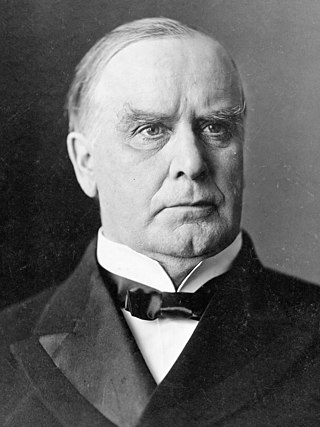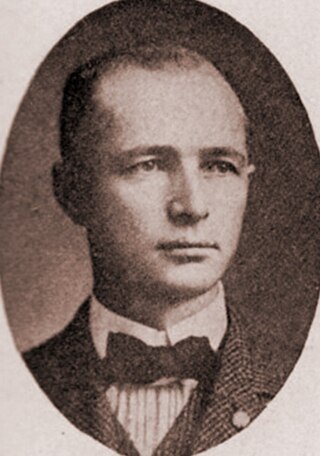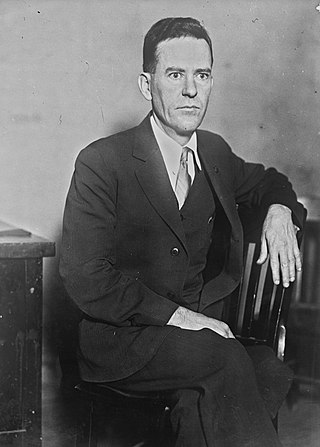Related Research Articles

The 1900 United States presidential election was the 29th quadrennial presidential election, held on Tuesday, November 6, 1900. In a re-match of the 1896 race, incumbent Republican President William McKinley defeated his Democratic challenger, William Jennings Bryan. McKinley's victory made him the first president to win a consecutive re-election since Ulysses S. Grant accomplished the same feat in 1872. Until 1956, this would be the last time in which an incumbent Republican president would win re-election after serving a full term in office. This election saw the fifth rematch in presidential history, something that would also not occur again until 1956. This was also the first rematch to produce the same winner both times.

The People's Party, also known as the Populist Party or simply the Populists, was a left-wing agrarian populist political party in the United States in the late 19th century. The Populist Party emerged in the early 1890s as an important force in the Southern and Western United States, but collapsed after it nominated Democrat William Jennings Bryan in the 1896 United States presidential election. A rump faction of the party continued to operate into the first decade of the 20th century, but never matched the popularity of the party in the early 1890s.

The 1946 United States Senate elections were held November 5, 1946, in the middle of Democratic President Harry S. Truman's first term after Roosevelt's passing. The 32 seats of Class 1 were contested in regular elections, and four special elections were held to fill vacancies. The Republicans took control of the Senate by picking up twelve seats, mostly from the Democrats. This was the first time since 1932 that the Republicans had held the Senate, recovering from a low of 16 seats following the 1936 Senate elections.

The 1944 United States Senate elections coincided with the re-election of Franklin D. Roosevelt to his fourth term as president. The 32 seats of Class 3 were contested in regular elections, and three special elections were held to fill vacancies.

The Socialist Party of Oregon (SPO) is the name of three closely related organizations — an Oregon state affiliate of the Social Democratic Party of America established in 1897 and continuing into the 1950s, as well as the Oregon state affiliate of the Socialist Party USA from 1992 to 1999.

Simon Wing was a daguerreotypist, camera inventor and socialist politician. He is best remembered as the first candidate of the Socialist Labor Party of America for President of the United States, running for that office in 1892.

Frank Tetes Johns was a carpenter and American socialist political activist and politician. He is best remembered for having been twice nominated for President of the United States by the Socialist Labor Party of America.

Benjamin Hanford was an American socialist politician during the late 19th and early 20th centuries. A printer by trade, Hanford is best remembered for his 1904 and 1908 runs for Vice President of the United States on the ticket of the Socialist Party of America, running next to Presidential nominee Eugene V. Debs. Hanford was also the creator of the fictional character "Jimmie Higgins," a prototypical Socialist rank-and-filer whose silent work on the unglamorous tasks needed by any political organization made the group's achievements possible — a character later reprised in a novel by Upton Sinclair.

Maximillian Sebastian Hayes was an American newspaper editor, trade union activist, and socialist politician. In 1912 Hayes became the first candidate to challenge Samuel Gompers for the presidency of the American Federation of Labor in nearly a decade, drawing about 30 percent of the vote in his losing effort. Hayes is best remembered as the long-time editor of the Cleveland Citizen and as the vice presidential candidate of the Farmer–Labor Party ticket in 1920.

Charles Horatio Matchett was an American socialist politician. He is best remembered as the first candidate of the Socialist Labor Party of America for Vice President of the United States in the election of 1892 and as the party's candidate for president in the election of 1896.

The Socialist Party of New York is the name of two distinct, but historically related state affiliates of the American socialist movement located in New York state. Emerging from a July 1899 split in the Socialist Labor Party of America, the organization existed first as the Social Democratic Party of New York, retaining that name even after the founding of the Socialist Party of America (SPA) in the summer of 1901. A presence was maintained in the state as the Socialist Party of New York for the next seven decades.
The Social Democratic Federation (SDF) was an American political party established as a result of a factional split in the Socialist Labor Party in 1889. Moving its headquarters through a succession of cities, the organization landed in Cleveland, Ohio, merging with the Social Democracy of America — forerunner of the Socialist Party of America — in the summer of 1897.

The Social-Democratic Party of Wisconsin (SDPW) was established in 1897 as the Wisconsin state affiliate of the Chicago faction of the Social Democratic Party of America. When that organization merged in 1901 to form a political party known as the Socialist Party of America, the Social-Democratic Party of Wisconsin became the state affiliate of that organization, retaining its original name.
Valentine Remmel was a member of the Socialist Labor Party of America (SLP) from Pittsburgh, Pennsylvania who was nominated for Vice President of the United States on the SLP ticket in 1900. Before that, he had been a candidate for the Presidential nomination, but was defeated by his later running mate, Joseph F. Malloney. A glass blower by profession and active in the labor movement, he left the SLP later between 1901 and 1910.

Thomas John "Tommy" Morgan, Jr. was an English-born American labor leader and socialist political activist. Morgan is best remembered as one of the pioneer English-speaking Socialists in the city of Chicago and a frequent candidate for public office of the Socialist Party of America. Morgan was also one of the founders and leading figures of the United Labor Party, an Illinois political party which elected 7 of its members to the Illinois State Assembly and another to the Illinois State Senate in the election of 1886. He was married to Elizabeth Chambers Morgan.

Simon Philip Van Patten (1852–1918) was an American socialist political activist prominent during the latter half of the 1870s and the first half of the 1880s. Van Patten is best remembered for being named the first Corresponding Secretary of the Workingmen's Party of the United States in 1876 and for heading it and its successor organization, the Socialist Labor Party of America, for the next six years. In 1883 Van Patten mysteriously disappeared, with his friends reporting him as a potential suicide to law enforcement authorities. He later turned up as a government employee, however, having abandoned radical politics in favor of stable employment.

John Calvin Chase (1870–1937) was an American trade union activist and politician.

The Socialist Labor Party (SLP) is a political party in the United States. It was established in 1876, and was the first socialist party formed in the country.

Verne LaRue Reynolds was an American socialist activist. Reynolds was a multi-time candidate for national office with the Socialist Labor Party of America.

John William Aiken was an American furniture finisher and socialist activist. Aiken was the vice-presidential and presidential nominee of the Socialist Labor Party of America.
References
- ↑ Congress, United States. (1900). Official Congressional Directory. U.S. Government Printing Office. pp. 47–. Retrieved 9 June 2017.
- 1 2 Wheeler, Edward Jewitt; Funk, Isaac Kaufman; Woods, William Seaver; Arthur Stimson Draper, Wilfred John Funk (1900). The Literary Digest. Funk & Wagnalls. pp. 8–. Retrieved 9 June 2017.
- ↑ Convention, Socialist Labor Party. National (1901). Proceedings of the ... National Convention of the Socialist Labor Party. New York Labor News Company. pp. 144–. Retrieved 26 July 2014.
- ↑ Richardson, Darcy (April 2007). Others: Third Parties During the Populist Period. iUniverse. pp. 125–. ISBN 9780595443048 . Retrieved 26 July 2014.